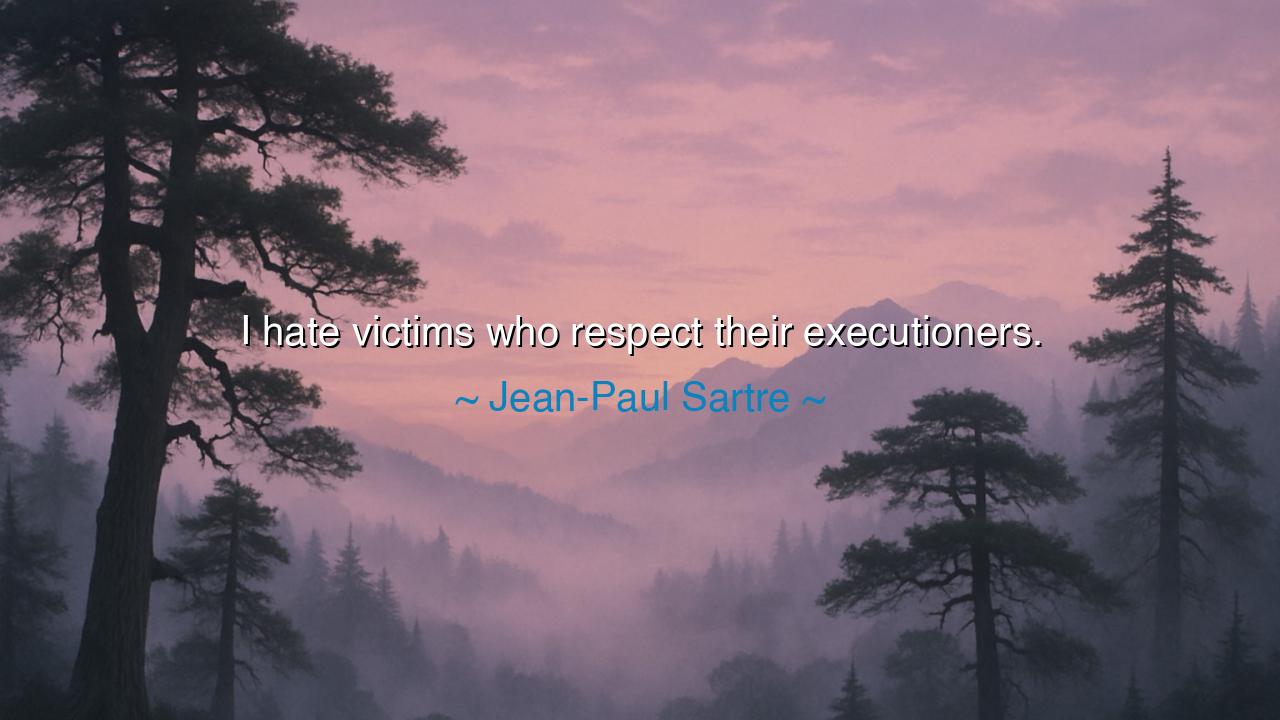
I hate victims who respect their executioners.






“I hate victims who respect their executioners.” Thus spoke Jean-Paul Sartre, philosopher of freedom and anguish, whose words pierce like a blade through the fog of submission. In this short cry he condemns the darkest betrayal—not that of the tyrant against the oppressed, but of the oppressed against themselves, when they bow in reverence to the very hand that strikes them down. It is a warning: when one gives honor to their destroyer, they not only lose their life, but they abandon the dignity of their spirit.
The ancients too wrestled with this truth. The Hebrews, enslaved in Egypt, cried out under the lash of Pharaoh. Yet some among them feared freedom more than bondage, remembering with longing the bread of captivity rather than risking the hunger of the wilderness. So it is with Sartre’s vision: the victim who kneels before the executioner, who cloaks tyranny with respect, deepens his own chains. For oppression thrives not only on power, but on the obedience of those it crushes.
History offers grim testimony. During the Nazi occupation of Europe, there were those who, in fear or weakness, sought to appease their masters, offering flattery to those who brought only ruin. Yet there were others who refused. In France, the Resistance rose—men and women, often powerless and outnumbered, yet unwilling to offer respect to their executioners. They sabotaged, they spoke, they fought, not because they expected victory, but because dignity demanded defiance. Their struggle embodies Sartre’s cry: better to die unbowed than to live as one who honors their oppressor.
But O children of the future, hear this well: Sartre’s words are not only about tyrants and war. They are about daily life, where smaller tyrannies abound. There are those who remain silent in the face of cruelty, who smile at the hand that demeans them, who accept insult as though it were honor. This too is the victim’s respect for the executioner. Each time you bow to injustice, each time you call evil “good” because you fear the cost of truth, you join the ranks of those Sartre despises.
Yet his hatred is not without purpose. It is a hatred born of love for freedom, for authenticity, for the unbroken human spirit. He calls us to remember that dignity is the last fortress of the oppressed. Even if the body falls beneath the sword, the spirit can stand tall by refusing to give the oppressor the gift of reverence. To honor one’s executioner is to surrender twice: first in body, and then in soul.
The lesson is clear: resist not only with your hands, but with your heart. Do not praise those who harm you. Do not excuse the unjust. Do not wrap chains in flowers and call them bracelets. Even if you must endure hardship, endure it with eyes unbowed, with words uncorrupted, with spirit unbroken. True strength lies not in survival at any cost, but in preserving the flame of dignity even in the shadow of death.
Therefore, let your practice be this: in small things and great, stand firm against those who seek to diminish you. Do not repay cruelty with flattery. Do not offer respect to those who wield destruction. Instead, honor truth, honor justice, honor yourself. Teach this to your children, that they may never mistake submission for virtue.
So I say unto you: remember Sartre’s warning. Better to face the executioner with defiance in your eyes than to live as one who kneels in gratitude to tyranny. For though the body may perish, the spirit that refuses to bow will endure, and its courage will echo across the ages.






AAdministratorAdministrator
Welcome, honored guests. Please leave a comment, we will respond soon